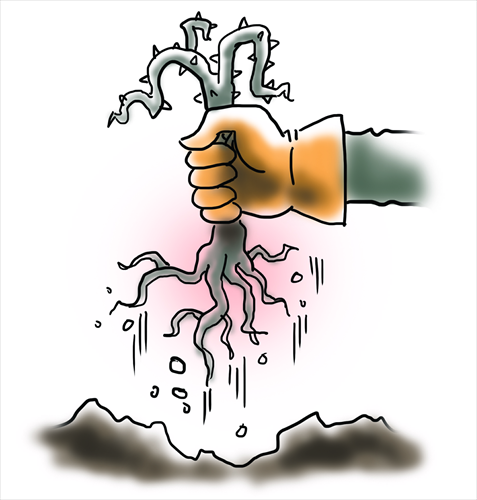Ideological battles vital to keep terror from spreading in Xinjiang

Illustration: Shen Lan/GT
Victories are mounting as strikes against East Turkestan Islamic Movement (ETIM)-linked terrorists and extremists in Northwest China's Xinjiang Uyghur Autonomous Region are going deeper. The living space of terrorism in the region has been squeezed by a drastic crackdown. However, there is still a long way to go, because we cannot win the war against terrorism if we fail to gain an edge in the battle of ideology.
The root cause for the perennial rampancy of terrorism is its nature as an ideology. For terrorists and their organizations, ideology is a spiritual pillar, on which they can kill innocents for an absurd and immoral cause. They spread their ideology to brainwash the public, recruit new members, mobilize their forces, conduct training and raise funds. The power of ideology can turn good citizens into atrocious thugs in a short time.
Terrorism cannot thrive without personnel, capital or equipment. Terrorist groups seduce followers and solicit public support under the banner of the terrorist ideology. The spread of the ideology can be used to raise funds for terrorist activities, and it urges terrorists to try every means to acquire deadly equipment. Uprooting the ideology should be the fundamental measure to eradicate terrorism.
As for the ETIM, national separatism is their ultimate goal, terrorism is a tool and religious extremism is a pretense and ideology. In order to exterminate religious extremism, we should lay bare the lies manufactured by the East Turkestan forces and their distortions of Islam, leaving no place for "wild imams" and illegal preaching activities.
Islam calls for peace and kindness, forbidding the killing of innocents. For example, although the Koran allows defensive war, it emphasizes that Muslims should "fight in the cause of God those who fight you, but do not transgress limits; for God loveth not transgressors."
In Islam, jihad has two aspects, but it has been mistranslated as "holy war" in English. In fact, the greater Jihad calls for self-discipline of heart and tongue, and the lesser jihad stresses discipline of hand and sword. Self-discipline is the precondition and basis of discipline.
However, terrorist groups ignore the requirements of the greater jihad, over-emphasizing the lesser jihad, and instigating their followers to drive away infidels by using violence. With this religious disguise, East Turkestan forces foment terrorist activities to undermine ethnic unity and plot the independence of Xinjiang.
The battle of ideologies, to some extent, is a rival of soft power. But soft power often plays a decisive role in many events. Counter-terrorism requires a package of measures that can deal with both immediate and fundamental problems. However, without a gambit in the battle of ideologies, we won't be able to uproot terrorism.
Terrorism cannot be eradicated without the use of force. Proactive strikes against any signs of terrorism are necessary to curb its expansion. However, if we only launched physical strikes without an ideological offensive, we could end up playing into hands of terrorists.
For decades, the Chinese government and the ruling party have invested a lot of resources into the border areas, especially Xinjiang, to develop their economy and society. These investments are popular among the people, including the majority of Uyghurs.
However, if we cannot solve the ideological problem, the terrorists who keep calling for a rejection of secularization can paint a lot of welfare projects that support Xinjiang's development as nothing but cynical exploitation and national oppression.
Since January 1 of this year, China's anti-terrorism law has been officially implemented. The law lays emphasis to comprehensive measures to fight terrorism. Ideology will be the priority of priorities. Although this will be a long and tough battle, we shall prevail.
The author is director of Research Center for National Security, the School of Public Administration and Policy, Renmin University of China. opinion@globaltimes.com.cn